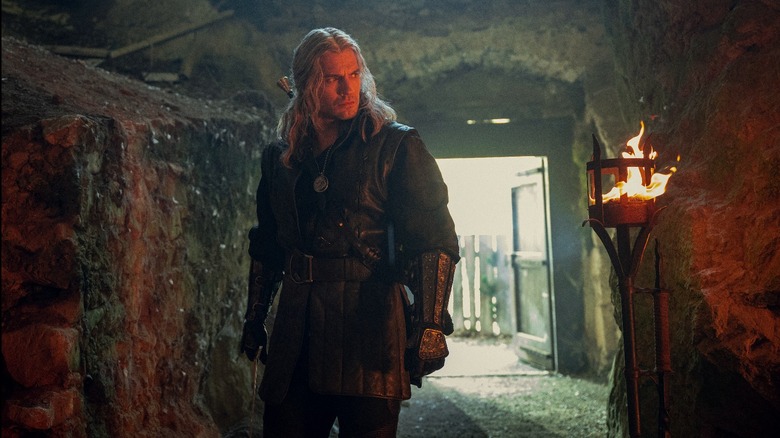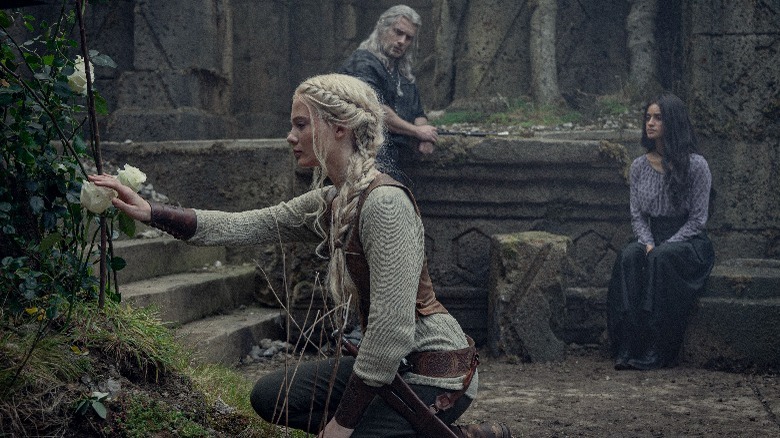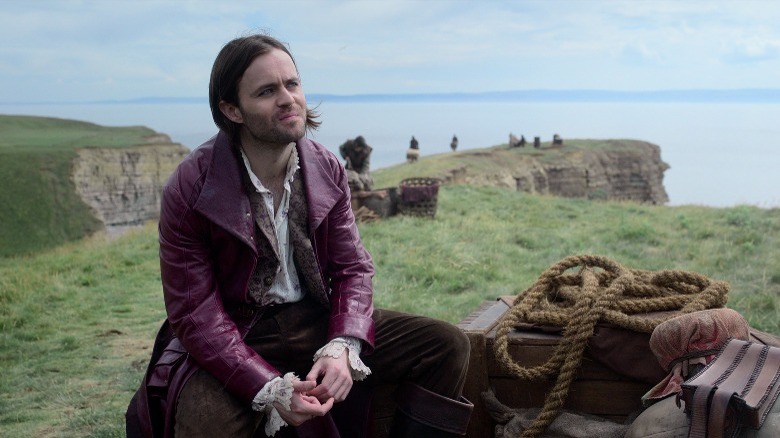The Witcher Season 3 Makes Some Major, And Sometimes Baffling, Changes From The Books
This post contains spoilers for "The Witcher" season 3 and the novel series.
Throughout the course of its first two seasons, Netflix's "The Witcher" has often strayed from its source material, taking more liberties with character origins and motivations to drive the story forward. The results have been pretty mixed so far — for instance, the decision to add more depth to Yennefer's (Anya Chalotra) relationship with parenthood was undoubtedly an empowering touch, but her eventual betrayal of Ciri (Freya Allan) completely destabilized the kind of dynamic they share in Andrzej Sapkowski's novel series. While Volume I of Season 3 seems much more faithful to the books and follows key events closely, the liberties taken here still stand out due to their confusing, needlessly complicated nature.
Sapkowski fans, along with those who've played "The Witcher" video game trilogy by CD Projekt Red, are aware of the importance of the Thanedd Coup, and how it was a turning point in the history of the Continent. This serves as the heart of season 3, which is much more inclined toward smart political intrigue, covert plots, and introducing new players to the game, and overall, it does a good job of approaching its climactic finale. Season 3 picks up right after the conclusion of its previous installment, dramatizing the emotional distance created between Geralt (Henry Cavill) and Yennefer after her choice to sacrifice Ciri to Voleth Meir. While Yennefer edged towards redemption by sacrificing herself in the end, things are far from perfect, as she must atone for her actions by taking on a more active role in guiding Ciri in the right direction.
Let's look into the major changes that the series makes in Volume I, what works despite the tweaks, and what doesn't when compared to the source material.
The bonds of found family
Yennefer has always been a complicated character in all renditions of "The Witcher." Although stern and upfront in the books, Yennefer's bond with Ciri is unquestionably rooted in loyalty, as she evolves into a maternal figure for her with time. As season 2 planted seeds of discord among the trio, the new season has to take the time to mend this by allowing the characters to express their deepest fears and regrets. As the trio journey together, Yennefer and Geralt refrain from directly engaging with one another, communicating solely through letters, which helps ground their dynamic in authenticity. While Geralt has not completely forgiven her, he is now more open to the idea of trusting Yennefer, who trains Ciri in elemental magic and protects her during a monster attack.
What's truly interesting about season 3 is the way it develops the relationship between Yennefer and Ciri. Ciri appears to be more forgiving than Geralt, allowing Yennefer to guide her, but is also wary of her decision to train her at Aretuza. Some of the best moments in the season culminate in a frantic argument between the two, where Ciri accuses Yen of lacking a backbone after the latter assumes a flippantly cruel persona in front of the mages. This spurs Ciri to run away and reunite with Geralt, highlighting the fact that he will always be a safe space for her, especially when she feels lost and betrayed.
Season 3 dives deeper into Yen's psyche as well, underlining how difficult it is for her to play these myriad roles, which often demand deception and strategic cunning. This version of Yen has more emotional layers than ever before, as we witness the moral dilemmas she finds herself embroiled in.
Imposter Ciri
Cirilla Fiona, also known as False Ciri, was a Ciri lookalike who was deliberately implanted to deceive Emperor Emhyr in the books, and her purpose was to act as a distraction, although she had no autonomy over her fate. Very little is known about Fiona's past, although it is likely that she became an orphan after the First Northern War, and survived by flitting through various refugee camps. Geralt was aware of her likeness to Ciri but played no part in using the girl as a decoy. However, the involvement of the fire mage Rience eventually led her to Nilfgaard, where Emhyr accepted her despite being aware of her true identity.
Season 3 introduces the girl, Teryn (Frances Pooley), but puts on a new spin on her origins. Here, False Ciri is the product of a monstrous experiment, wherein her memories are overwritten with Ciri's true memories, thanks to a vial of Elder Blood that Rience (Sam Woolf) possesses. Geralt crosses paths with her and tries to save her, and although the real culprit is yet to be revealed, these new changes complicate and deepen her role in the story as a whole. As False Ciri genuinely believes that she is Cirilla of Cintra, her fate is more tragic than in the books, allowing new antagonists to machinate from the shadows.
A murky conspiracy is likely to be revealed soon, and it is unclear how Geralt and the real Ciri will react to these developments, and why, if at all, Teryn will end up at Nilfgaard. As the real Ciri is aware of this conspiracy, she feels guilty for the pain her very existence has brought to innocent girls like Teryn, whose minds have been mutated and altered beyond recognition to serve a more nefarious purpose.
The reasons behind the Thanedd ball
In the aftermath of the Battle of Sodden Hill, Emhyr is furious, eager to direct his wrath at the Northern Mages. The very reason the Thanedd banquet even takes place is Emhyr's direct involvement, as it's an elaborate trap set by him that leads to a "Game of Thrones" style Red Wedding bloodbath. There are traitors in the mix, ready to strike, and the implications are both personal and political. Season 3 foregoes these necessary reasons, and nuances, in favor of Yennefer organizing the ball before the Conclave of the Mages, which makes little sense when measured against the larger conspiracies that grip the Continent.
The series sets up Vilgefortz (Mahesh Jadu) as the one covertly pulling the strings, possibly as a ploy to lure Ciri out and use her for his own ends. While Volume I ends with this major reveal, the effects are rather underwhelming — what could have been an exciting, complex series of politically-fueled backstabbings and ploys unravels as childish games instead. In the books, the coup completely destroys the Brotherhood, and while that still might happen in the show, the lack of urgency dulls the impact that the events hope to strive for.
Moreover, due to the way seasons 1 and 2 set up the dynamic between Yen and the other Mages, it becomes less than believable when they permit her to host the event despite the fact that they view her as a traitor. While Yen and Tissaia's (MyAnna Buring) tender bond is still understandable, the role she ends up playing in exposing Stregobor (Lars Mikkelsen) comes off as extremely forced. While the Thanedd sequence is shot exquisitely, involving almost-clever event loops and reveals, it ends up feeling hollow in comparison to the one in the books.
Other major changes
Both in the books and the games, Jaskier, also known as Dandelion, is a flirtatious bard known for his long string of lovers, who are often miffed with him due to his inconsistent and flighty affections. While the source material mostly depicts Jaskier with a preference for women, it is not radical to assume that he would also prefer men, as it is in keeping with his penchant to have torrid affairs with anyone he finds remotely interesting. In season 3, Jaskier (Joey Batey) has a new love interest. However, the problem lies in the fact that the love interest in question is Radovid (Hugh Skinner), the future tyrant of Redania who is canonically known to be a rather horrible person.
Here, Radovid is yet to become Redania's mad king and is introduced as a conniving, yet sensitive soul. While competent character arcs are absolutely capable of investing one person with contrarian impulses, wherein one sheds their humanity to embrace a crueler stance, the Jaskier-Radovid romance only adds unnecessary layers of tragedy for the beloved bard in question. Moreover, humanizing Radovid this early on might be an attempt at dramatic effect, but the fact that Jaskier is forced to cooperate with Philippa further complicates matters and can have disastrous consequences. After all, Radovid hunts down mages in the books, and it will interesting how events play out with Jaskier involved.
Apart from this, the newest installment of "The Witcher" seems to have an overarching problem of resolving the complications that it introduced willingly in the first place. While this is undoubtedly the best season of the series so far, the show is yet to commit fully to its bold choices and make them work in a fashion that works well with the lore it roots itself in.




